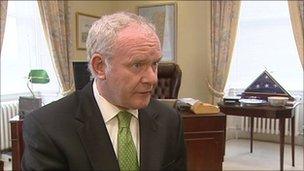Irish presidential race: A tale of the unexpected
- Published
- comments

Martin McGuinness has transformed himself from an IRA commander into a political big beast
Oscar Wilde wrote in his play An Ideal Husband that "to expect the unexpected shows a thoroughly modern intellect".
Clearly that's the kind of intellect required to keep track of Sinn Fein.
Last weekend, Martin McGuinness told 大象传媒 Radio Ulster's Inside Politics that he didn't know where the bookmakers had got his name from in relation to the Irish presidency.
But crucially he didn't rule himself out, insisting he was a party loyalist.
Bold tactics
Fast forward seven days and he is standing outside a Sinn Fein executive meeting in Dublin, proclaiming his intention to become a "People's President" and leaning so strongly on his track record of working with unionists that you might almost think Ian Paisley is his election agent.
No-one should be surprised. Mr McGuinness's switch from Foyle to Mid-Ulster was a similarly bold tactic. Then the party transported Mitchel McLaughlin to South Antrim and Gerry Adams to Louth.
Mr McGuinness says the decision has been difficult for his family, but Sinn Fein retain enough of their old discipline and central command that their representatives fall into line with the grand plan.
It's hard to imagine other parties being able to move their people around like pieces on a chessboard in such a dramatic fashion.
The move is not without its risks. Mr McGuinness's status has been enhanced by his high profile role in sharing power and working to export lessons in peacemaking to other trouble spots around the world.
Not all will agree with the Reverend David Latimer's description of him as "one of the great leaders of modern times", but there's no doubt that he has transformed himself from an IRA commander into a political "big beast".
If he is beaten into second or third place could he lose that statesman sheen?
Dilemma
Against that Sinn Fein is already reaping the rewards in enhanced media attention and the obvious discomfort of its southern opponents.
Fianna Fail now faces a dilemma in whether or not to allow its TDs to back David Norris.
Senator Norris might be able to attract votes which would otherwise go to Martin McGuinness - but the controversy which led to his withdrawal from the race does not endear him to many of Fianna Fail's more conservative Catholic grassroots supporters.
Back at Stormont the Education Minister John O'Dowd steps temporarily into the Deputy First Minister's shoes. Will this mean that the wheels of the devolved government grind even more slowly than before?
Mr McGuinness said Peter Robinson reacted "philosophically" when told the news 24 hours prior to its announcement.
Whatever else this is a deliberate statement by Sinn Fein that they continue to regard Stormont as a "transitional" compromise and their eyes remain on the 32-county picture.
As the campaign wears on, Mr McGuinness will no doubt face plenty of questions about his IRA past, including what he knew about the proxy bomb killing of cook Patsy Gillespie or the murder of informer Frank Hegarty.
He is likely to handle these with as cool a manner as he has done previously. The question will be whether the whiff of cordite alienates or engages the Irish electorate.
If the Mid Ulster MP loses, but with an enhanced vote,
Sinn Fein will portray the campaign as a useful plank in its all Ireland project.
If he wins, then all bets are off. Certainly, as Mr McGuinness put it himself, the Irish presidential election has got a lot more interesting.